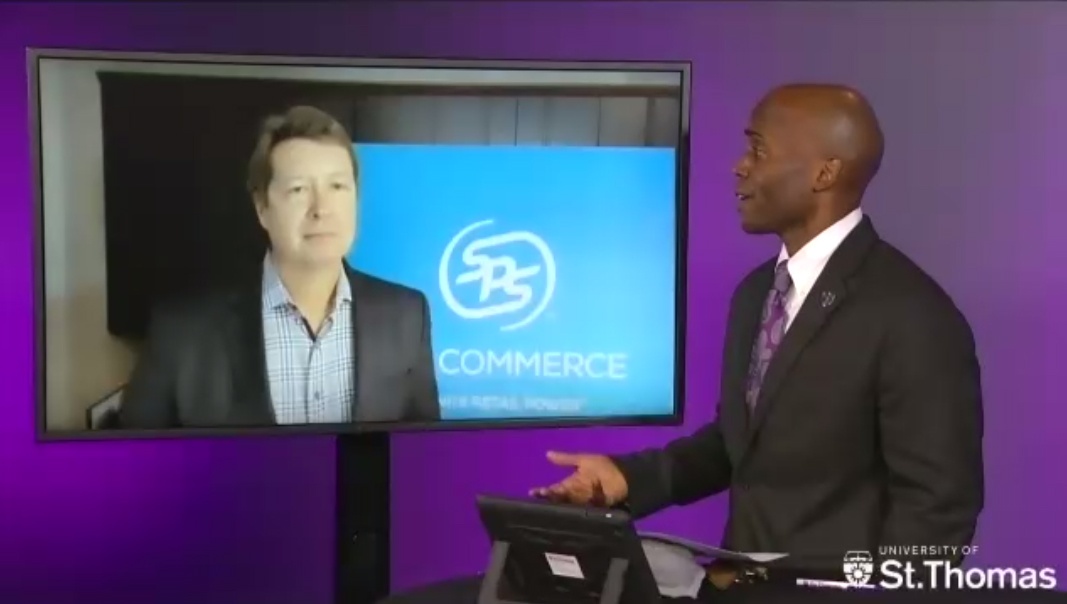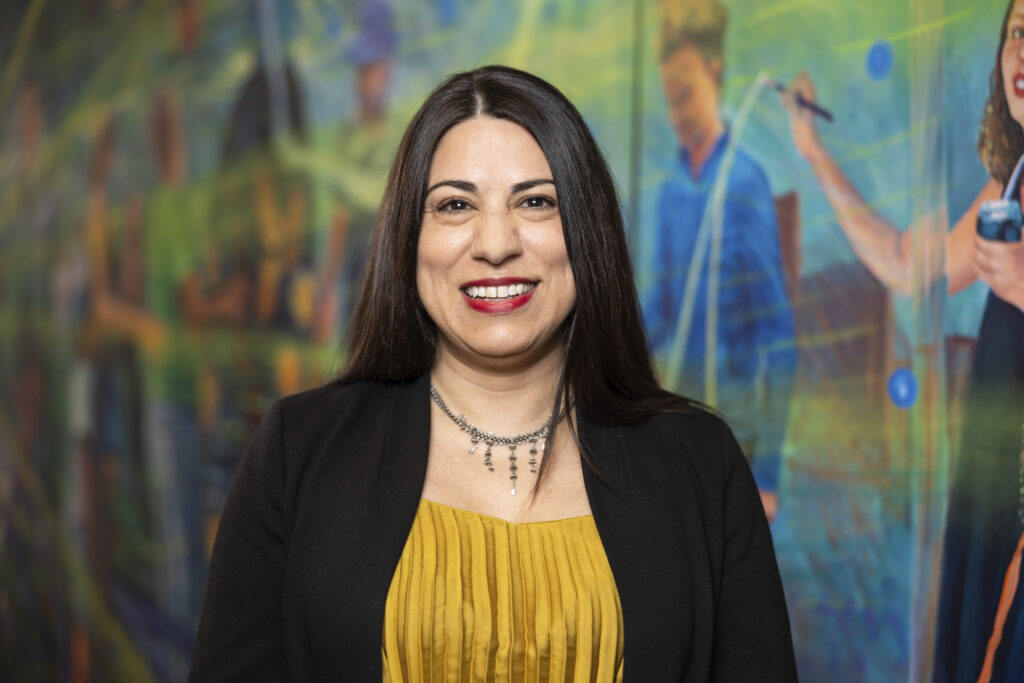Archie Black, CEO and president of SPS Commerce, sat down with Distinguished University Chair, Professor and Founding Director of the Racial Justice Initiative Dr. Yohuru Williams on Nov. 6 for the First Friday Speaker Series to discuss pressing racial issues and how to increase diversity, equity and inclusion (DEI) individually, as a university, as a workforce and as a society.
Here are five observations from the conversation, during which Williams announced that Black was named the inaugural Racial Justice Initiative Fellow.
1. We have to be generous and have grace with each other in difficult conversations.
Leadership requires us to be uncomfortable. As a leader of Minnesota’s largest publicly traded technology company, Black spoke passionately about using his platform to design intentional change within his company in order to be a pioneer for diversity, equity and inclusion. Black explained for the past 20 years, SPS Commerce has updated its strategic priorities in order to promote equal opportunities for all.
To really understand issues that minorities commonly face, Black explained he has met with numerous employees of color to hear about their life and occupational experiences. At one of these meetings, one employee of SPS Commerce asked Black, “Did you tell your boys that when they get in a car, they should put their wallet on the dashboard so that when they get pulled over – and they are likely to get pulled over – they don’t have to reach into their pockets?” This experience was “really impactful” for Black and motivated him further to put DEI at the forefront of the organization.
Black continued, “One individual told me (once), ‘You know Archie, it is not just white supremacists that are the problem, it is also the progressives. We need to change everybody.” The issue is, he explained, is that people are focused on fixing the problem rather than on how the problem originated. By looking back and understanding how our society has created a culture of discrimination and oppression for people of color, Black expressed confidence that as a community we will be able to move forward more educated and intentional.
2. Root conversations about racial inequality in history or start with the basic facts of how we got here.
“Every time we try to solve a problem at SPS Commerce or attack a strategic initiative, we always start with education. We have to understand the problem,” Black said. Until 1965, Black individuals faced housing segregation. The essential civil rights concern of housing was affecting living patterns for minorities. The Civil Rights Act of 1968, or the Fair Housing Act, was a powerful tool aimed at ending racial residential segregation, replacing racial ghettos with racially integrated neighborhoods and dismantling segregation in Minnesota.
“I think when those conversations aren’t rooted in history, what you get the polarization … people get confronted with language, (and) they become very defensive. When we’re looking at, for example, the history of housing segregation in Minneapolis and people can see the deeds. They can hear stories of pain that go along with communities that were displaced and denied as a result ... and kind of understand what impact that had in terms of the history of this community as a whole,” Williams said. With 400 years in the making, racial discrimination is going to take time and longitudal engagement for our society to create long-term improvements in DEI.
3. We need to shift to being anti-racist instead of just not being racist.
At SPS Commerce, in order to create change Black explained he first needed to look within his four walls and have a direct intent to make his workplace more diverse. “I don’t think we intended to be a white business, but we didn’t intend not to,” Black explained. Furthermore, Black acknowledged that the excuse of saying comments like, “I am not racist” need to be translated to “I am not anti-racist” in order to recreate the status quo. “In society if you are not against something and it is the status quo, the status quo will continue to exist. And so I think it is a time for many of us to look in the mirror and see the world around us,” he said. Black explained SPS Commerce has focused on intentionality in recent DEI efforts. “We weren’t intentional. At least at SPS Commerce, (when we are) more intentional we usually have more success,” he said.
Shifting from the mindset of reflecting non-racist, to anti-racist values at SPS Commerce meant promoting and retaining qualified Black employees, celebrating important events such as Martin Luther King Jr. Day and recently announcing their first Black board member appointee. Additionally, Black is promoting conversations about systemic racism in the SPS Commerce workplace by creating a four-year tuition scholarship program which includes internship and mentoring for Black students. “You need a couple short-term victories with long-term victories. I think it is important for people to buy in and see that you are ready to change, and it is not just cheap talk,” Black remarked.
4. In our organizations, education needs to be front and center.
At SPS Commerce, Black wanted to tackle the lack of diversity head on. He explained he wants to look back at his role as a leader and say that he and his organization made a real long-term difference. Right now, SPS Commerce is going through an in-depth educational process which includes educating the executive team, leadership leaders, management and all employees. Black said SPS Commerce is about 65% of the way toward the goal of educating all employees on DEI history and values. To keep the momentum, Black explained his organization has made a strategic initiative, Reducing Systemic Racism. “It is really just getting everyone aware,” Black commented. Furthermore, opportunities such as listening sessions, the formation of a Black advisory group and celebrating Juneteenth by giving employees a $100 stipend to spend at Black-owned businesses are all recent improvements at SPS Commerce.
5. The Twin Cities is a laboratory for taking action.
“The Twin Cities is really a laboratory. This is a big city and there is a lot of great energy here,” Williams acknowledged. We have clear metrics which will help make a positive impact around issues of discrimination. For example, in education there are goals to promote incremental change. “In the Twin Cities and in Minnesota particularly, we have a significant, significant hole to dig out of for education,” Black said. Minnesota reflects substantial inequalities in education outcomes such as graduation rates, test scores, college readiness and more, which are gaps outlined by race, ethnicity and income. Black said that not educating our Black students to the level they deserve is a problem that if we don’t solve soon, we will be talking about for a long time.
Black encouragingly remarked, “The Minnesota Business Partnership is very, very active in lobbying and attempting to move the dial in education. We have worked really hard with Neel Kashkari and Justice Page to have a constitutional amendment which would allow every student to have a quality education and we have fought very hard for early childhood scholarship.”
By educating oneself in these communal inequalities and continuing efforts to address the concern of racial discrimination, both Black and Williams were confident that the Twin Cities can be a trailblazer for DEI in our country. Black quoted Williams saying, “The goal is to make this a movement and not a moment.”







